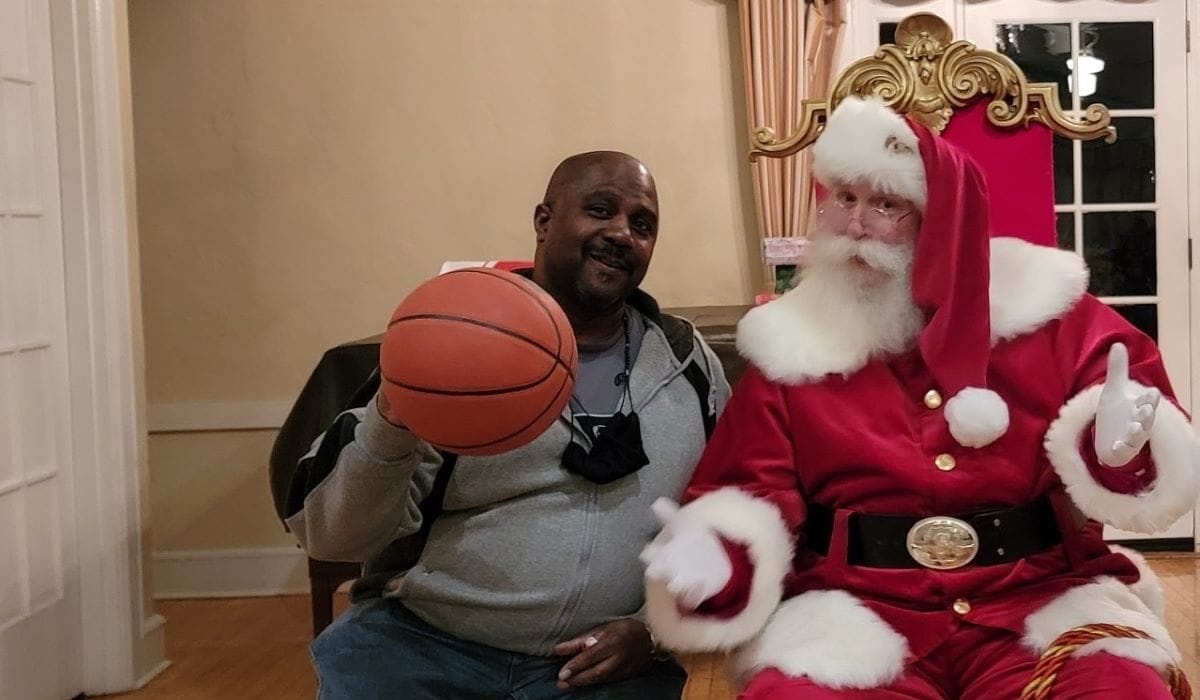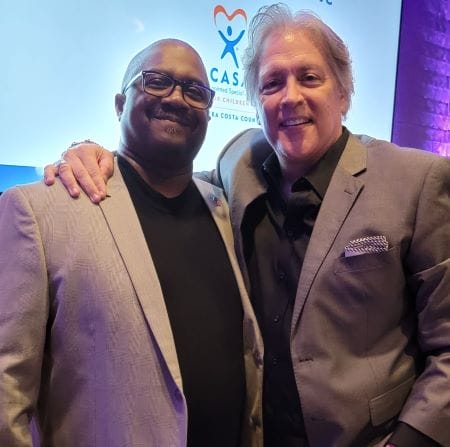Finding Family, Moving Forward

Meet Daily Point of Light Award honoree Paul Griffith. Read his story, and nominate an outstanding volunteer or family as a Daily Point of Light.
Paul Griffith is a self-described gearhead who enjoys the arts. More than anything, he loves spending time with his family. He drives 40 minutes to visit his mom once a week, something he hopes to increase after he retires from his career in the oil refining industry in a few short weeks.
Another priority for his upcoming free time will be going back to school for a teaching degree. Paul wants to be a junior high substitute history teacher, to use his life experience to add context to the subject that he didn’t enjoy as a kid. He has always cared deeply about children. As well as having three of his own, he has been a Court-Appointed Special Advocate (CASA) for children in the foster care for over 15 years.
CASA is a national nonprofit that pairs volunteers with children in the foster care system under the jurisdiction of the court to help them through challenges associated with living in the system. Paul has been a friendly face and a guiding hand for kids facing highly difficult circumstances. His efforts sometimes end in disappointment or even tragedy, but on the occasions everything goes well, he sets kids up for a successful, independent future.
What inspires you to volunteer?
I’m thankful for all the opportunities I’ve been afforded. I got into the oil industry and was paid very well. I was able to take care of my family. I wanted my children to be good, balanced people who understood the opportunities they had in life. The best way to do that was to teach them, not just using words but by example. I also wanted to give back to my community.
Tell us about your volunteer role as a Court Appointed Special Advocate in Solano County and beyond.
We’re court-appointed for a child and given full rights—the court is their legal guardian—until they are in a permanent situation or turn 18 and are, unfortunately, left to fend for themselves. We work with social workers, educational advocates, medical advocates and the transitional advocate social workers to help these children prepare to become adults.
That includes helping them navigate emotions, trying to find family members who could become guardians and helping them deal with the transition. The top priority of the court is reuniting them with a parent when possible. Unfortunately, a lot of the parents are dealing with drug addiction or mental health issues.

We typically meet with a child and first spend time trying to break through and make a connection. People they’ve trusted in the past have not done what they should have done. There’s also a lot of abuse that goes on. They have to move a lot, so they learn to adapt and not hold on to the simple things that most children would, like toys. For them, it’s the survival stuff, like socks and underwear.
They’re given maybe an hour to gather all their belongings in a couple of garbage bags and move on to the next location. They’ll change schools, too, so we help them with the social aspect of moving. We also write court reports to advocate on the child’s behalf.
Outside of CASA, I also tutor a couple times a week through my library for non-native English speakers. I help them achieve practical language goals. For example, some want to get a better job or be able to help their children with homework.
What are some of the main ways that your CASA role differs from social workers?
Most of the time, social workers see the children once or twice a month, whereas we are there once a week. Social workers have a caseload of 25 to 30 children. For us, one to two is usually the limit, so we can be more focused and fill the gaps.
Every six months, there is a court hearing called a permanency hearing to find out if we’ve made any progress in finding a relative or friend willing to take the child more permanently. So, part of our job is having conversations and researching behind the scenes to see if there is a viable candidate for guardianship or fostering.
What’s been the most rewarding part of your work?
The most rewarding part is to see them grow to their potential and become self-sufficient adults. Most kids initially think we’re getting paid, and when they find out that we’re not, they’ll be like, “So you do all that just to help me?” Seeing that connection, that bond and then seeing them being able to open up and trust someone, is a great reward.
What have you learned through your experiences as a volunteer?
I’ve seen some of the worst behaviors of people and the scars that have been created for children of generations to come. But I’ve also learned of the resiliency of children, of those who go on to have a normal functioning life. I’ve learned to appreciate what I have.
How can someone sign up for CASA in their own area?
Just about every county has a CASA program, and they usually offer training several times a year. Training takes six to eight weeks, and they try to prepare you for all of the nuances of what it’s going to entail.
Why is it important for others to get involved with causes they care about?
Doing things for others gives us that connection to other people. We need that. We were made to be a part of a community or tribe, and when we don’t have that, it can be traumatic, especially for a child. And it creates adults who are in a lot of need, pain, suffering and silence. I believe the greatest gift that you can give is yourself.
What do you want people to learn from your story?
We need people who are willing to give, especially their time. The things I remember most about my childhood aren’t the gifts I got for holidays. They’re the moments with family. As we get older and wiser, we see how important those connections, experiences and times with family were. Everyone should have an opportunity to have that.
Do you want to make a difference in your community like Paul? Find local volunteer opportunities.